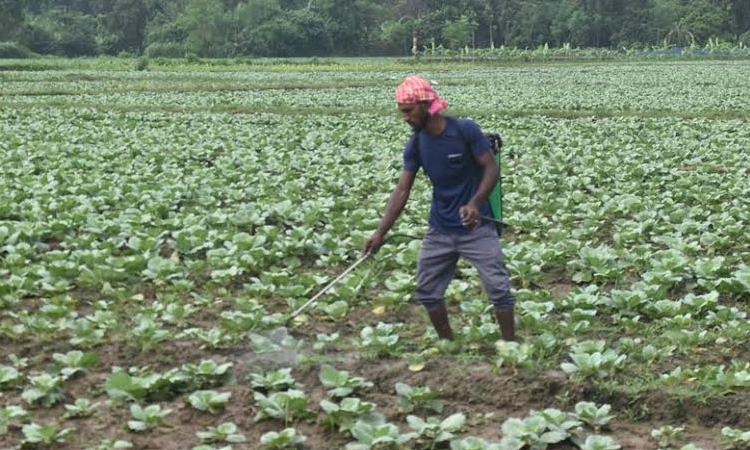News Flash
News Flash

By Md Aynal Haque
RAJSHAHI, Oct 6, 2025 (BSS) - Early cultivation of winter vegetables has brought smiles to hundreds of farmers across Rajshahi region, including the Barind tract, as they are reaping good yields and fetching lucrative prices in the market well ahead of the season.
Retail and wholesale markets in the region have been flooded with early varieties of winter vegetables over the past few weeks, benefitting both growers and consumers alike. While farmers are earning handsome profits, buyers are enjoying access to fresh vegetables much earlier than usual.
Farmers in the region are successfully cultivating early varieties of cauliflower, cabbage, radish, carrot, beet, turnip, tomato, leafy spinach, and red spinach using both commercial and homestead methods.
The trend of advanced winter vegetable farming is gaining ground, as high-yield crop varieties and low water requirements make it an ideal option for the drought-prone Barind area. Supportive government and non-government initiatives, including training and motivational programmes, are encouraging more farmers to shift away from high-irrigation crops like Irri-Boro.
Swapan Ali, 45, from Panchandar village under Tanore upazila, has emerged as a model vegetable farmer in his area. Once unable to cultivate rice due to irrigation scarcity, he began with brinjal farming on five decimals of fallow land and now earns Taka 3 to 4 lakh annually.
Another successful farmer, Muktar Ali, 45, from Hatibandha village in Godagari upazila, expressed his satisfaction with the yield and market prices. He cultivated cabbage on three bighas, papaya on one bigha, and brinjal on another three bighas of land.
"I have been selling cabbage at Taka 40-50 per piece and brinjal at Taka 80-90 per kg directly from my field over the past few weeks," he said.
His neighbour Saiful Alam, 30, has also brought three bighas of land each under papaya, brinjal, and cabbage cultivation and is pleased with his returns.
In Fulbari village of the same upazila, Jamil Ahammed, 53, has cultivated around 10,000 cauliflowers on two bighas. "I expect to start harvesting soon. Just a few days ago, cauliflowers were selling at Taka 60-70 each in the local market," he added.
Atanu Sarker, Sub-Assistant Agriculture Officer of Godagari upazila, said that hundreds of farmers are benefitting from early winter vegetable cultivation. The practice is steadily expanding in the Barind region as farmers move away from water-intensive crops.
Former Director of the Department of Agricultural Extension (DAE) Monzurul Huda told BSS that high-yield varieties of common and non-conventional vegetables like broccoli are gaining popularity due to rising market demand, especially in urban areas and the hospitality sector.
He said both large-scale commercial farming and small-scale homestead cultivation are contributing to improved nutrition and economic self-reliance in rural areas.
Development activist Jahangir Alam Khan said that vegetable farming is playing a vital role in poverty reduction and improving the financial conditions of smallholder farmers. The rising demand for fresh vegetables, both locally and in metropolitan markets, is motivating farmers to increase production.
He added that DAE and Bangladesh Agricultural Research Institute (BARI), among other organisations, are actively supporting the shift to vegetable cultivation - a practice that consumes less underground water, which is crucial for the water-stressed Barind region.